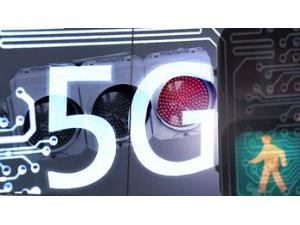



Date:14/06/19
 The Cabinet of Japan on Friday approved a project to install 5G wireless relay devices, to support the provision of 5G services, on traffic signals across the country.
The Cabinet of Japan on Friday approved a project to install 5G wireless relay devices, to support the provision of 5G services, on traffic signals across the country.
5G network technology requires more relay spots than current 4G services, as it uses short-length radio waves that cannot pass through buildings. But there is a lack of suitable locations for new base stations as existing ones already house equipment for current services. The government will, therefore, allow 208,000 traffic signals to be used to deploy the new 5G equipment, expecting to the network installation to be complete by the end of March 2026.
The new wireless service is able to send and receive data about 100 times faster than the current 4G network. Smartphone users, for example, will be able to download a two-hour film in just three seconds.
Four mobile phone service operators — NTT Docomo Inc., KDDI Corp., SoftBank Corp. and e-commerce giant Rakuten Inc. — are planning to launch 5G services across the nation in 2020, after the Ministry of Internal Affairs and Communications allocated them the relevant frequency bands in April.
As well as using the traffic signals to deliver the 5G network, the government also plans to upgrade them with communication functions that allow them to collect and share more traffic data.
Japan’s government is promoting the next-generation service amid growing competition with other nations such as the United States and China, and is hoping to take the lead in developing and utilizing 5G. The superfast networks are also expected to help develop technology for driverless cars and achieve other technological breakthroughs such as allowing construction machinery and robots to be operated remotely.
The four mobile phone carriers have said they will not use equipment made by Chinese tech giant Huawei Technologies Co., a leader in the field of the next-generation wireless service, or ZTE Corp, another Chinese telecommunications company.
The government decided in December to effectively exclude the two firms from public procurement following U.S. concerns over the companies’ perceived close ties with the Chinese government.
Japan to install 5G network relay devices on traffic signals
 The Cabinet of Japan on Friday approved a project to install 5G wireless relay devices, to support the provision of 5G services, on traffic signals across the country.
The Cabinet of Japan on Friday approved a project to install 5G wireless relay devices, to support the provision of 5G services, on traffic signals across the country.5G network technology requires more relay spots than current 4G services, as it uses short-length radio waves that cannot pass through buildings. But there is a lack of suitable locations for new base stations as existing ones already house equipment for current services. The government will, therefore, allow 208,000 traffic signals to be used to deploy the new 5G equipment, expecting to the network installation to be complete by the end of March 2026.
The new wireless service is able to send and receive data about 100 times faster than the current 4G network. Smartphone users, for example, will be able to download a two-hour film in just three seconds.
Four mobile phone service operators — NTT Docomo Inc., KDDI Corp., SoftBank Corp. and e-commerce giant Rakuten Inc. — are planning to launch 5G services across the nation in 2020, after the Ministry of Internal Affairs and Communications allocated them the relevant frequency bands in April.
As well as using the traffic signals to deliver the 5G network, the government also plans to upgrade them with communication functions that allow them to collect and share more traffic data.
Japan’s government is promoting the next-generation service amid growing competition with other nations such as the United States and China, and is hoping to take the lead in developing and utilizing 5G. The superfast networks are also expected to help develop technology for driverless cars and achieve other technological breakthroughs such as allowing construction machinery and robots to be operated remotely.
The four mobile phone carriers have said they will not use equipment made by Chinese tech giant Huawei Technologies Co., a leader in the field of the next-generation wireless service, or ZTE Corp, another Chinese telecommunications company.
The government decided in December to effectively exclude the two firms from public procurement following U.S. concerns over the companies’ perceived close ties with the Chinese government.
Views: 403
©ictnews.az. All rights reserved.Similar news
- Azerbaijani project to monitor disease via mobile phones
- Innovative educational system to be improved under presidential decree
- NTRC prolongs license of two TV and radio organizations for 6 years
- Azerbaijan establishes e-registry for medicines
- Azerbaijani museum introduces e-guide
- Nar Mobile opens “Nar Dunyasi” sales and service center in Siyazan city
- International conference on custom electronic services held in Baku
- OIC secretary general to attend COMSTECH meeting in Baku
- Azerbaijan develops earthquake warning system
- New law to regulate transition to digital broadcasting in Azerbaijan
- Azerbaijani State Social Protection Fund introduces electronic digital signature
- Intellectual traffic management system in Baku to be commissioned in December
- Tax Ministry of Azerbaijan started receiving video-addresses
- World Bank recommends Azerbaijan to speed up e-service introduction in real estate
- Azerbaijan to shift to electronic registration of real estate





















